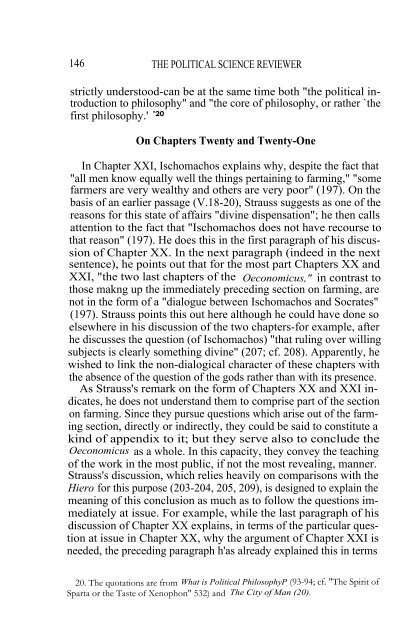Strauss on Xenophon's Socrates Xenophon's Socratic Discourse: An ...
Strauss on Xenophon's Socrates Xenophon's Socratic Discourse: An ...
Strauss on Xenophon's Socrates Xenophon's Socratic Discourse: An ...
You also want an ePaper? Increase the reach of your titles
YUMPU automatically turns print PDFs into web optimized ePapers that Google loves.
146 THE POLITICAL SCIENCE REVIEWER<br />
strictly understood-can be at the same time both "the political introducti<strong>on</strong><br />
to philosophy" and "the core of philosophy, or rather `the<br />
first philosophy.' "20<br />
On Chapters Twenty and Twenty-One<br />
In Chapter XXI, Ischomachos explains why, despite the fact that<br />
"all men know equally well the things pertaining to farming," "some<br />
farmers are very wealthy and others are very poor" (197). On the<br />
basis of an earlier passage (V.18-20), <str<strong>on</strong>g>Strauss</str<strong>on</strong>g> suggests as <strong>on</strong>e of the<br />
reas<strong>on</strong>s for this state of affairs "divine dispensati<strong>on</strong>"; he then calls<br />
attenti<strong>on</strong> to the fact that "Ischomachos does not have recourse to<br />
that reas<strong>on</strong>" (197). He does this in the first paragraph of his discussi<strong>on</strong><br />
of Chapter XX. In the next paragraph (indeed in the next<br />
sentence), he points out that for the most part Chapters XX and<br />
XXI, "the two last chapters of the Oec<strong>on</strong>omicus," in c<strong>on</strong>trast to<br />
those makng up the immediately preceding secti<strong>on</strong> <strong>on</strong> farming, are<br />
not in the form of a "dialogue between Ischomachos and <strong>Socrates</strong>"<br />
(197). <str<strong>on</strong>g>Strauss</str<strong>on</strong>g> points this out here although he could have d<strong>on</strong>e so<br />
elsewhere in his discussi<strong>on</strong> of the two chapters-for example, after<br />
he discusses the questi<strong>on</strong> (of Ischomachos) "that ruling over willing<br />
subjects is clearly something divine" (207; cf. 208). Apparently, he<br />
wished to link the n<strong>on</strong>-dialogical character of these chapters with<br />
the absence of the questi<strong>on</strong> of the gods rather than with its presence.<br />
As <str<strong>on</strong>g>Strauss</str<strong>on</strong>g>'s remark <strong>on</strong> the form of Chapters XX and XXI indicates,<br />
he does not understand them to comprise part of the secti<strong>on</strong><br />
<strong>on</strong> farming. Since they pursue questi<strong>on</strong>s which arise out of the farming<br />
secti<strong>on</strong>, directly or indirectly, they could be said to c<strong>on</strong>stitute a<br />
kind of appendix to it; but they serve also to c<strong>on</strong>clude the<br />
Oec<strong>on</strong>omicus as a whole. In this capacity, they c<strong>on</strong>vey the teaching<br />
of the work in the most public, if not the most revealing, manner.<br />
<str<strong>on</strong>g>Strauss</str<strong>on</strong>g>'s discussi<strong>on</strong>, which relies heavily <strong>on</strong> comparis<strong>on</strong>s with the<br />
Hiero for this purpose (203-204, 205, 209), is designed to explain the<br />
meaning of this c<strong>on</strong>clusi<strong>on</strong> as much as to follow the questi<strong>on</strong>s immediately<br />
at issue. For example, while the last paragraph of his<br />
discussi<strong>on</strong> of Chapter XX explains, in terms of the particular questi<strong>on</strong><br />
at issue in Chapter XX, why the argument of Chapter XXI is<br />
needed, the preceding paragraph h'as already explained this in terms<br />
20. The quotati<strong>on</strong>s are from What is Political PhilosophyP (93-94; cf. "The Spirit of<br />
Sparta or the Taste of Xenoph<strong>on</strong>" 532) and The City of Man (20).

















